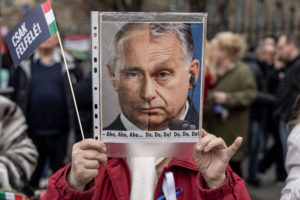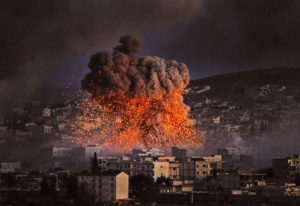The Russian invasion of Ukraine is widely seen as drawing the curtain on the era of Western domination that defined the Nineties. Yet the End of History was not a peaceful time: the conflict now raging in Eastern Europe was inaugurated by a war that started 30 years ago this week in another formerly communist multinational federation, the Socialist Federal Republic of Yugoslavia.
Despite their distance in time and space, not to mention qualitative differences of magnitude and geopolitical significance, the conflicts in Ukraine and Bosnia nonetheless remain entangled. Fundamental questions that have surfaced over the past month — over European strategic autonomy, Germany’s status as a great power, multipolarity and the role of Nato expansion — all emerged with the war in Bosnia.
The German recognition of the secession of Slovenia and Croatia from Yugoslavia in 1991 — in express defiance of the US secretary of state at the time, James Baker — spurred the collapse of the Yugoslav federation, leading to Bosnia’s bid for secession and its slide into civil war. At the time, German defiance of the US was taken to signal the revival of German power in the wake of the country’s reunification in 1990. Yet its fumbling for foreign policy independence was eventually ended by Washington, which reasserted its strategic domination on the continent with a Nato bombing campaign against Bosnian Serb forces that helped bring the war to an end in 1995. Followed by war in Kosovo in 1999, the wars of Yugoslav secession only ended in 2001 with a Nato deployment to end a conflict brewing in North Macedonia.
Although Western military intervention in another multi-national, multi-ethnic ex-communist federation spurred fears in the Kremlin that the West would reprise such adventures in the ex-Soviet Union during the Nineties, the collapse of the Russian state and the low price of oil meant that there was little Russia could do to stymie Nato expansion in the region. Russian weakness helped foster the mirage of a continent that had transcended great power rivalries, which would in turn smooth the path for Nato’s reckless policy expansion eastwards. Nonetheless, there were occasional portents of future conflict, such as when British Lieutenant-general Sir Mike Jackson refused the orders of his Nato commanding officer to fire on a Russian column attempting to seize Pristina airport in Kosovo.
The war in Bosnia and the brutality that defined it shattered the Long Peace that had prevailed in Europe since the end of the Second World War. Today, the Russian invasion of Ukraine has had a similarly shattering effect on a public that seems to have forgotten the wars in former Yugoslavia. Such collective amnesia — which also omits the bloody Greek Civil War that ended in 1949 — evinces a peculiar Eurocentrism, which treats European territory as if it were holy soil consecrated for perpetual peace by European blood, and as if Europe’s bloody history of internecine war makes war less rather than more likely.
The Nato-led international intervention that brought the wars of Yugoslav secession to an end were seen as restoring the peace of Europe. In reality, however, the diplomatic, military and humanitarian tools developed in the Balkans would become instruments for extending war outside of Europe. All the elements of the international intervention in the Bosnian war would be globalised in subsequent decades across conflicts in Africa and the Middle East. Arms embargoes, sanctions against “rogue regimes”, No-Fly Zones that escalated into bombing campaigns conducted alongside proxy forces and favoured ethnic militias, the deployments of large and militarised United Nations peacekeeping operations, the establishment of protectorates and international criminal courts — all these became the political and military instruments of a new global humanitarian order. Bosnia remains a de facto protectorate of the European Union to this day, hosting international forces and even sporting a blue and yellow flag expressly modelled on that of the EU.
The implications of humanitarian intervention in the Balkans were understood in Moscow even if not in Brussels or Washington. Vladimir Putin has repeatedly cited the precedent of Nato’s 1999 Kosovo War as a legal and political justification for his dismemberment of Ukraine with the annexation of Crimea in 2014, which was modelled on how Nato oversaw the detachment and independence of the former Serbian province in 2008. So we find ourselves in a situation where Russia claims to be retaliating against Nato encroachment in its sphere of influence in Ukraine, while in the Balkans it is Nato and the EU that decry Russian interference in stoking support for Serb secessionism in Bosnia.
This geopolitical tangle of imperial hypocrisy shows that we are fully returned to a baleful era of great power spheres of influence, depriving smaller powers in Europe of the political space for their sovereignty and independence. The Balkans have been returned to their nineteenth century status, as what was formerly a single sovereign state has been reduced to a clutch of small, dependent states enmeshed in mutual hostility and rivalry as they jostle for great power patronage.
Given the war in Ukraine and renewed geopolitical rivalries in the Balkans, what are the prospects for Europe’s middle and smaller powers to emerge from tutelage? During the First World War, the British journalist H.H. Munro published The Purple of the Balkan Kings, a short story during the First Balkan Wars of 1912-1913, which had laid the ground for the Great War itself. The story recounts the discomfiture of his absurdly named protagonist Luitpold Wolkenstein, a “financier and diplomat on a small, obtrusive, self-important scale” who, while sitting in his favourite Viennese café, is astounded to read of the military victories of the Balkan League in rolling back the Ottoman Empire in Europe. Munro recounts how vital the subordination of the Balkan states was to Wolkenstein’s mental tranquility:
“His judgment had been one of unsparing contempt for small-scale efforts, of unquestioning respect for the big battalions and full purses. Over the whole scene of the Balkan territories and their troubled histories had loomed the commanding magic of the words ‘the Great Powers’…”
Filled with dread at the prospect that the Balkan states might redraw the map of Europe independently of the Great Powers, and that they might even roll their military victories over into a “project of fiscal unity, extending over the entire Balkan lands, and further of a constitutional union”, Munro has his “plump-bodied café oracle” retire from his café in a depressive mood.
Today, latter-day Wolkensteins are firmly back in charge in Europe, not only in Vienna but also especially in Brussels, with their own equivalents in Moscow. Social media provides them with a hubbub that would easily outdo an early twentieth century Viennese café for its complacent febrility and bourgeois extremism. Thinking of the two Eastern European wars that now frame the rise and fall of the era of liberal hegemony — Bosnia and Ukraine respectively — will Europe’s smaller states ever be able to assert their independence against imperial domination?
There is a real risk that a peace settlement for Ukraine reproduces the problems that have plagued post-war Bosnia, which has been carved up into separate, ethnically homogenous statelets with no meaningful central government able to exert sovereignty over the territory as a whole. Ukraine would also carry the further risk of being torn between West and East, with the two halves of the country divided between Brussels and Moscow respectively.
Describing Russian war crimes as “genocide” risks overshadowing the political questions at the core of the conflict. If Ukraine is to safeguard the independence it is fighting for, it must not only repel the Russian invasion but also avoid becoming a Western protectorate, dependent on Nato arms and EU aid to survive. Neutrality offers Ukraine the best hope of preserving its sovereignty. In due course, a neutral Ukraine may even offer an example of how smaller and weaker European states may escape Balkanisation in the years to come.
Disclaimer
Some of the posts we share are controversial and we do not necessarily agree with them in the whole extend. Sometimes we agree with the content or part of it but we do not agree with the narration or language. Nevertheless we find them somehow interesting, valuable and/or informative or we share them, because we strongly believe in freedom of speech, free press and journalism. We strongly encourage you to have a critical approach to all the content, do your own research and analysis to build your own opinion.
We would be glad to have your feedback.
Source: UnHerd Read the original article here: https://unherd.com



